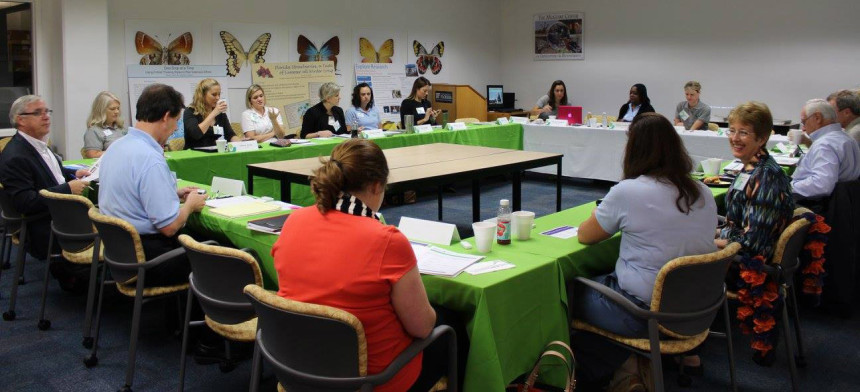
Advisory Board members praised recent PIE Center research and communications initiatives and urged faculty and staff to build relationships by seeking more in-person meetings and presentation opportunities with groups throughout Florida.
For the board’s third annual meeting, members gathered with PIE Center faculty, staff, students and UF/IFAS officials at the Florida Museum of Natural History in Gainesville. The 15-member board represents private businesses, government agencies, public organizations and academic sectors of agriculture and natural resources.
To increase awareness of the PIE Center among commodity associations and trade organizations, board members agreed the PIE Center should attend association trade shows as well as organizational meetings to share the PIE Center’s research and establish relationships. The board also suggested crafting an informational document for board members and affiliates to bring to their own meetings.
Advisory board member Mallory Dimmitt, executive director of the Florida Wildlife Corridor suggested creating a training program for trade organizations to learn how to gather and understand consumer attitudes and opinions.
“We’re all being encouraged to do a better job of telling our story, and we would appreciate the help,” Dimmitt said. “Associations and organizations don’t know how to capture attitudes and opinions of consumer choices.”
Advisory board member Regina Thomas, senior vice president and chief business development officer for Farm Credit of Central Florida, said, “Talk about what you are doing on social media and contact ag organizations because they are willing to share your information.”
During the meeting, PIE Center director Ricky Telg discussed the renewed focus on social media. Media specialist Laura Bernheim and assistant Ashley McLeod created an Instagram account and implemented how to best communicate with, engage and inform audiences through Facebook and Twitter.
“One of our goals last year was to increase our social media presence, and we are definitely doing something right,” Telg said. The PIE Center Facebook page has grown to reach more than 1,500 fans, while its Twitter page boasts more than 700 followers.
Other changes to PIE Center online communications platforms includes an easier-to-navigate listing of research projects, information about faculty and staff skills and interests, as well as reinstating the guest blog series.
Telg said the PIE Center faculty and staff was thankful for the guidance the board provided.
“I felt the meeting was a success and the PIE Center is very grateful and appreciative of the advice the members provided,” Telg said.
















